

Yorùbá religion. The Yorùbá religion comprises the traditional religious and spiritual concepts and practices of the Yorùbá people.
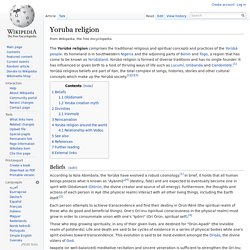
Its homeland is in Southwestern Nigeria and the adjoining parts of Benin and Togo, a region that has come to be known as Yorùbáland. Yorùbá religion is formed of diverse traditions and has no single founder. It has influenced or given birth to a host of thriving ways of life such as Lucumí, Umbanda and Candomblé.[1] Yorùbá religious beliefs are part of Itan, the total complex of songs, histories, stories and other cultural concepts which make up the Yorùbá society.[1][2][3] Beliefs[edit] According to Kola Abimbola, the Yorùbá have evolved a robust cosmology.[1] In brief, it holds that all human beings possess what is known as "Àyànmô"[4] (destiny, fate) and are expected to eventually become one in spirit with Olódùmarè (Olòrún, the divine creator and source of all energy). Prayer to one's Orí Òrún produces an immediate sensation of joy. Wicca. This pentacle, worn as a pendant, depicts a pentagram, or five-pointed star, used as a symbol of Wicca by many adherents.

Wicca is a diverse religion with no central authority or figure defining it. It is divided into various lineages and denominations, referred to as traditions, each with its own organisational structure and level of centralisation. Due to its decentralized nature, there is some disagreement over what actually constitutes Wicca. Some traditions, collectively referred to as British Traditional Wicca, strictly follow the initiatory lineage of Gardner and consider the term Wicca to apply only to such lineaged traditions, while other eclectic traditions do not. Terminology[edit] Application of the word Wicca has given rise to "a great deal of disagreement and infighting". Beliefs[edit] Beliefs vary markedly between different traditions and individual practitioners. Shinto. Shinto priest and priestess.
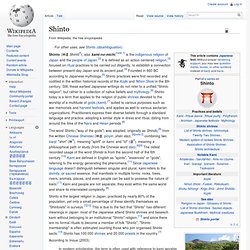
Shinto (神道, Shintō?) , also kami-no-michi,[note 1] is the indigenous religion of Japan and the people of Japan.[2] It is defined as an action-centered religion,[3] focused on ritual practices to be carried out diligently, to establish a connection between present-day Japan and its ancient past.[4] Founded in 660 BC according to Japanese mythology,[5] Shinto practices were first recorded and codified in the written historical records of the Kojiki and Nihon Shoki in the 8th century. Still, these earliest Japanese writings do not refer to a unified "Shinto religion", but rather to a collection of native beliefs and mythology.[6] Shinto today is a term that applies to the religion of public shrines devoted to the worship of a multitude of gods (kami),[7] suited to various purposes such as war memorials and harvest festivals, and applies as well to various sectarian organizations.
According to Inoue (2003): Types of Shinto Shrine Shinto (神社神道, Jinja-Shintō?) Kami. Hinduism. Hinduism is the dominant religion, or way of life,[note 1] in South Asia, most notably India.
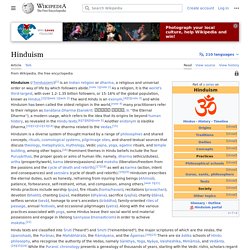
It includes Shaivism, Vaishnavism and Shaktism among numerous other traditions, and a wide spectrum of laws and prescriptions of "daily morality" based on karma, dharma, and societal norms. Hinduism is a categorisation of distinct intellectual or philosophical points of view, rather than a rigid, common set of beliefs. Hinduism, with about one billion followers[web 1] is the world's third largest religion, after Christianity and Islam.
Hinduism has been called the "oldest religion" in the world,[note 2] and some practitioners refer to it as Sanātana Dharma, "the eternal law" or the "eternal way"[3] beyond human origins. Western scholars regard Hinduism as a fusion[note 3] or synthesis[note 4] of various Indian cultures and traditions,[6][note 5] with diverse roots[note 6] and no single founder. Etymology Definitions Colonial influences Indigenous understanding Sanātana Dharma Growing Hindu identity. Catholicism. Bible. Christianity. Christianity is an Abrahamic religion that began as a Jewish sect in the mid-1st century.[9][10] Originating in the Levant region of the Middle East, it quickly spread to Syria, Mesopotamia, Asia Minor and Egypt.
It grew in size and influence over a few centuries, and by the end of the 4th century had become the official state church of the Roman Empire, replacing other forms of religion practiced under Roman rule.[11] During the Middle Ages, most of the remainder of Europe was Christianized, and adherents were gained in the Middle East, North Africa, Ethiopia and parts of India.[12][13] Following the Age of Discovery, Christianity spread to the Americas, Australasia, sub-Saharan Africa, and the rest of the world through missionary work and colonization.[14][15][16] Christianity has played a prominent role in the shaping of Western civilization.[17][18][19][20][21] Beliefs Creeds Its main points include: Ten Commandments These are quotes from Deuteronomy 6:4 and Leviticus 19:18. Zen. Zen is a school of Mahayana Buddhism[note 1] that developed in China during the Tang dynasty as Chán.

From China, Zen spread south to Vietnam, northeast to Korea and east to Japan. Islam. Islam (/ˈɪslɑːm/;[note 1] Arabic: الإسلام, al-ʾIslām IPA: [ælʔɪsˈlæːm] ( )[note 2]) is a monotheistic and Abrahamic religion articulated by the Qur'an, an Islamic holy book considered by its adherents to be the verbatim word of God (Allāh), and for the vast majority of adherents, also by the teachings and normative example (called the Sunnah and composed of hadith) of Muhammad (c. 570–8 June 632 CE), considered by most of them to be the last prophet of God.

An adherent of Islam is called a Muslim. Most Muslims are of two denominations: Sunni (75–90%)[8] or Shia (10–20%).[9] About 13% of Muslims live in Indonesia,[10] the largest Muslim-majority country, 25% in South Asia,[10] 20% in the Middle East,[11] and 15% in Sub-Saharan Africa.[12] Sizable minorities are also found in Europe, China, Russia, and the Americas. Converts and immigrant communities are found in almost every part of the world (see Islam by country). Buddhism. Religion founded by the Buddha Buddhism (, ) is an Indian religion based on a series of original teachings attributed to Gautama Buddha.
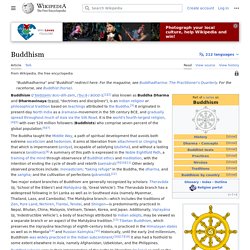
It originated in ancient India as a Sramana tradition sometime between the 6th and 4th centuries BCE, spreading through much of Asia. It is the world's fourth-largest religion[3] with over 520 million followers, or over 7% of the global population, known as Buddhists.[6] Buddhism encompasses a variety of traditions, beliefs and spiritual practices largely based on the Buddha's teachings (born Siddhārtha Gautama in the 5th or 4th century BCE) and resulting interpreted philosophies.
Two major extant branches of Buddhism are generally recognized by scholars: Theravāda (Pali: "The School of the Elders") and Mahāyāna (Sanskrit: "The Great Vehicle"). Theravada has a widespread following in Sri Lanka and Southeast Asia such as Cambodia, Laos, Myanmar and Thailand. Judaism. Judaism (from the Latin Iudaismus, derived from the Greek Ἰουδαϊσμός, and ultimately from the Hebrew יהודה, Yehudah, "Judah";[1][2] in Hebrew: יהדות, Yahadut, the distinctive characteristics of the Judean ethnos)[3] is the religion, philosophy and way of life of the Jewish people.[4] Judaism is a monotheistic religion, with the Torah as its foundational text (part of the larger text known as the Tanakh or Hebrew Bible), and supplemental oral tradition represented by later texts such as the Mishnah and the Talmud.
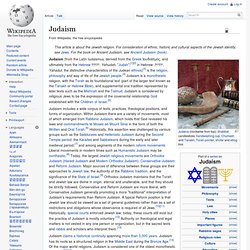
Judaism is considered by religious Jews to be the expression of the covenantal relationship God established with the Children of Israel.[5] Judaism includes a wide corpus of texts, practices, theological positions, and forms of organization. Judaism claims a historical continuity spanning more than 3,000 years. Defining character and principles of faith Defining character Glass platter inscribed with the Hebrew word zokhreinu - remember us Core tenets 13 Principles of Faith: